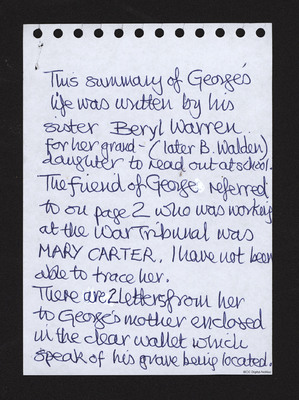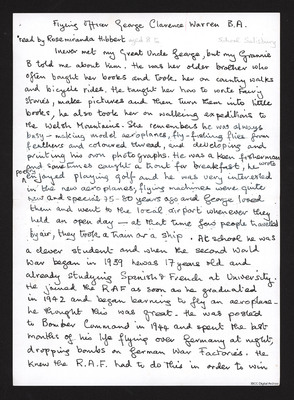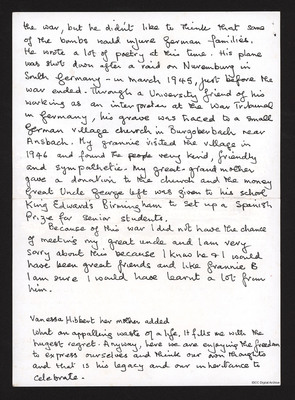A Brief Introduction to George Warren's Life
Title
A Brief Introduction to George Warren's Life
Description
The summary was written by George's sister for her grand-daughter to read out at school. Although Rosemiranda never met Great Uncle George she was told all about him by her Grandmother.
George did well at school and he was fascinated by aeroplanes. He enlisted, joined Bomber Command but was shot down over Nuremberg in March 1945. His grave is in Burgoberbach, near Ansbach.
Her mother has added a footnote about the appalling waste of life.
George did well at school and he was fascinated by aeroplanes. He enlisted, joined Bomber Command but was shot down over Nuremberg in March 1945. His grave is in Burgoberbach, near Ansbach.
Her mother has added a footnote about the appalling waste of life.
Creator
Language
Format
Three handwritten sheets
Publisher
Rights
This content is available under a CC BY-NC 4.0 International license (Creative Commons Attribution-NonCommercial 4.0). It has been published ‘as is’ and may contain inaccuracies or culturally inappropriate references that do not necessarily reflect the official policy or position of the University of Lincoln or the International Bomber Command Centre. For more information, visit https://creativecommons.org/licenses/by-nc/4.0/ and https://ibccdigitalarchive.lincoln.ac.uk/omeka/legal.
Contributor
Identifier
BWarrenBWarrenGCv10001,
BWarrenBWarrenGCv10002,
BWarrenBWarrenGCv10003
BWarrenBWarrenGCv10002,
BWarrenBWarrenGCv10003
Transcription
This summary of George’s life was written by his sister Beryl Warren (later B. Walden) for her grand daughter to read out at school. The friends of George referred to on page 2 who was working at the War Tribunal was Mary Carter. I have not been able to trace her.
There are two letters from her to George’s mother enclosed in the clear wallet which speaks of his grave being located.
[page break]
Flying Officer George Clarence Warren B.A.
Read by Rose Miranda Hibbert.
I never met my Great Uncle George, but my Grannie B told me about him. He was her older brother who often bought her books and took her on country walks and bicycle rides. He taught her how to write fairy stories, make pictures and then turn them into little books, he also took her on walking expeditions to the Welsh mountains. She remembers he was always busy – making model aeroplanes, fly-fishing flies from feathers and coloured thread, and developing and printing his own photographs. He was a keen fisherman and sometimes caught a trout for breakfast, he wrote poetry enjoyed playing golf and he was very interested in the new aero planes; flying machines were quite new and special 75 – 80 years ago and George loved them and went to the local airport whenever they held an open day – at that time few people travelled by air, they took a train or a ship. At school he was a clever student and when the second world war began in 1939 he was 17 years old and already studying Spanish and French at university. He joined the RAF as soon as he graduated in 1942 and began learning to fly an aeroplane – he thought this was great. He was posted to Bomber Command in 1944 and spent the last months of his life flying over Germany at night, dropping bombs on German war factories. He knew the R.A.F. had to do this in order to win
[page break]
the war, but he didn’t like to think that some of the bombs would injure German families.
He wrote a lot of poetry at this time. His plane was shot down after a raid on Nuremburg in South Germany in March 1945, just before the war ended. Through a university friend of his working as an interpreter at the War Tribunal in Germany, his grave was traced to a small German village church in Burgobenbach near Ansbach. My Grannie visited the village in 1946 and found the people very kind, friendly and sympathetic. My Great-Grandmother gave a donation to the church and the money Great Uncle George left was given to his school King Edward’s Birmingham to set up a Spanish prize for senior students.
Because of this war I did not have the chance of meeting my Great Uncle and I am very sorry about this because I know he and I would have been great friends and like Grannie B I am sure I would have learnt a lot from him.
Vanessa Hibbert her mother added
What an appalling waste of life. It fills me with the hugest regret. Anyway, here we are enjoying the freedom to express ourselves and think our own thoughts and that is his legacy and our inheritance to celebrate.
There are two letters from her to George’s mother enclosed in the clear wallet which speaks of his grave being located.
[page break]
Flying Officer George Clarence Warren B.A.
Read by Rose Miranda Hibbert.
I never met my Great Uncle George, but my Grannie B told me about him. He was her older brother who often bought her books and took her on country walks and bicycle rides. He taught her how to write fairy stories, make pictures and then turn them into little books, he also took her on walking expeditions to the Welsh mountains. She remembers he was always busy – making model aeroplanes, fly-fishing flies from feathers and coloured thread, and developing and printing his own photographs. He was a keen fisherman and sometimes caught a trout for breakfast, he wrote poetry enjoyed playing golf and he was very interested in the new aero planes; flying machines were quite new and special 75 – 80 years ago and George loved them and went to the local airport whenever they held an open day – at that time few people travelled by air, they took a train or a ship. At school he was a clever student and when the second world war began in 1939 he was 17 years old and already studying Spanish and French at university. He joined the RAF as soon as he graduated in 1942 and began learning to fly an aeroplane – he thought this was great. He was posted to Bomber Command in 1944 and spent the last months of his life flying over Germany at night, dropping bombs on German war factories. He knew the R.A.F. had to do this in order to win
[page break]
the war, but he didn’t like to think that some of the bombs would injure German families.
He wrote a lot of poetry at this time. His plane was shot down after a raid on Nuremburg in South Germany in March 1945, just before the war ended. Through a university friend of his working as an interpreter at the War Tribunal in Germany, his grave was traced to a small German village church in Burgobenbach near Ansbach. My Grannie visited the village in 1946 and found the people very kind, friendly and sympathetic. My Great-Grandmother gave a donation to the church and the money Great Uncle George left was given to his school King Edward’s Birmingham to set up a Spanish prize for senior students.
Because of this war I did not have the chance of meeting my Great Uncle and I am very sorry about this because I know he and I would have been great friends and like Grannie B I am sure I would have learnt a lot from him.
Vanessa Hibbert her mother added
What an appalling waste of life. It fills me with the hugest regret. Anyway, here we are enjoying the freedom to express ourselves and think our own thoughts and that is his legacy and our inheritance to celebrate.
Collection
Citation
Beryl Warren, “A Brief Introduction to George Warren's Life,” IBCC Digital Archive, accessed July 27, 2024, https://ibccdigitalarchive.lincoln.ac.uk/omeka/collections/document/26745.
Item Relations
This item has no relations.



